AgriBiz
SKUAST-K concludes 21-day training on remote sensing, GIS
Published
3 years agoon
By
BK Editor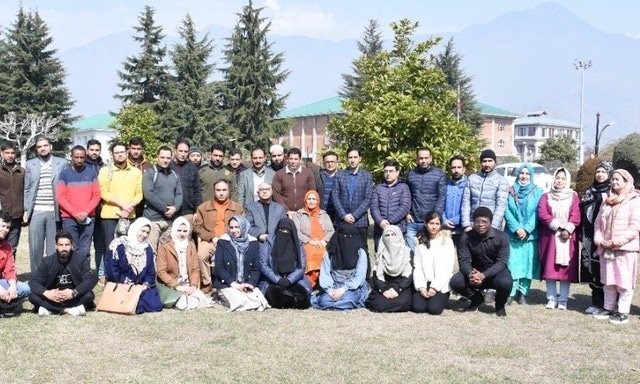
Srinagar, Feb 25: For enhancing the skills of students and faculty in global natural resource management, Sher-e-Kashmir University of Agricultural Sciences and Technology, Kashmir conducted a 21-day training programme on Remote Sensing and GIS Technology.
The ‘Remote Sensing & GIS Technology & Applications for Natural Resource Management’ training was organised by the university’s Division of Soil Science, Faculty of Horticulture under the World Bank-ICAR funded National Agricultural Higher Education Project (NAHEP) for the institutional development of SKUAST-K.
About 25 students and 15 faculty members from various faculties of SKUAST-K, the University of Kashmir and some other institutions participated in the 21-day training.
Speaking at the valedictory function, Vice-Chancellor, SKUAST-K, Prof Mushtaq Ahmad, emphasized the use of GIS in various agricultural fields like pathology, soil science, entomology, veterinary science forestry and fisheries. He also stressed to conduct more such training programmes in the future. While congratulating the organisers for such initiatives to skill the students and staff, he assured his full support for conducting such events in the future as well.
Director, Planning and Monitoring, and Principal Investigator NAHEP, Prof Nazir Ahmad Ganai, while speaking at the occasion, said that faculty and students should regularly update the skills to keep themselves abreast with the changing technologies to reduce redundancy. While stressing the importance of machine learning and robotics in modern agriculture, he said SKUAST-K is collaborating with various institutes across the globe for mainstreaming the new-age technologies in agriculture research and education at the university and their application in the field.
Prof Dil Mohammed Makhdhoomi, Controller of Examination, SKAUST-K, emphasized on the importance of remote sensing and GIS for the researchers in today’s era. Head, Division of Soil Science, Dr Fareeda Akhter apprised the august audience regarding the achievement of the Programme. Dr Shabir Ahmad Bangroo, AP Soil Science and course director of the training programme highlighted the importance of the current training programme for effective and efficient management of natural resources in the present climate change scenario.
Prof Muzaffar Ahmad Malik, Associate Director of Education welcomed the guests; Dr Mohammad Iqbal Bhat course co-director presented the vote of thanks. Dr Owais Bashir conducted the proceedings of the programme and Dr Tajamul Islam Shah was the student facilitator of the training programme. Besides, several SKUAST-K faculty, staff and students participated in the valedictory function.
You may like
-

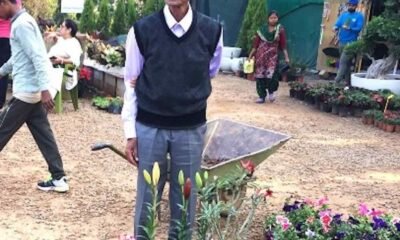


Kya kuchh tha jiske kehne ko: A tribute to father
-

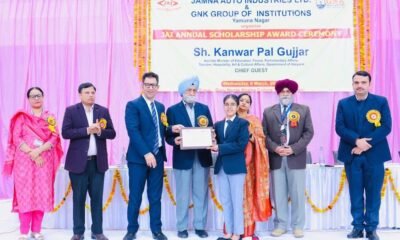


GNK hosts JAI scholarship distribution function
-

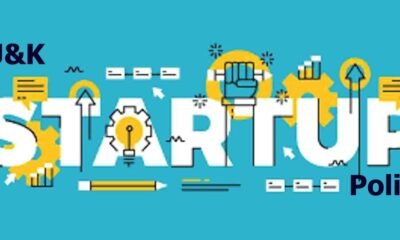


Administrative Council approves J&K Startup Policy 2024-27
-

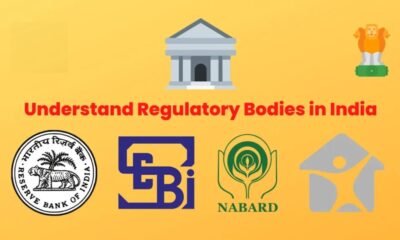


How to begin investing
-




The rising modest fashion sector of Kashmir
-

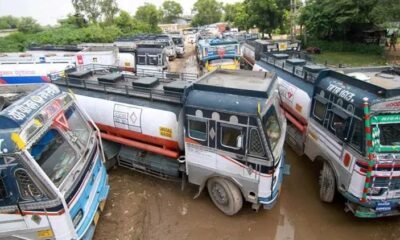


J&K Oil Tankers Union demands package, seeks tax rebate for transport sector in Budget 2024
AgriBiz
SKUAST-K innovator clinches Rs5lakh RKVY Raftaar grant
Published
7 months agoon
January 9, 2024By
BK Editor

BK News
Srinagar: An innovator from Sher-e-Kashmir University of Agricultural Sciences and Technology of Kashmir, Shaista Khan, has bagged Rs5lakh RKVY Raftaar grant for Herbodyne, an herbal toothpaste based on an indigenous Kashmir plant.
Presently pursuing PhD from the SKUAST-K’s Faculty of Forestry, Benhama campus has been awarded the grant under RKVY RAFTAAR, MANAGE, Hyderabad from Ministry of Agriculture and Farmer’s Welfare, Govt. of India. She was mentored by Prof TH Masoodi, Registrar SKUAST-K, Prof Imtiyaz Murtaza, Division of Basic Sciences and Humanities, Prof Parvez Ahmad Sofi, Prof. and Head, Div of FPU and Dr Nazir Ahmad Pala, Div of Silviculture and Agroforestry, Faculty of Forestry.
On talking to her, Shaista Khan says that it happened only due to the mentorship and support that she received from the mentors and the Faculty of Forestry, SKUAST-K. She expresses heartfelt gratitude to Prof Nazir Ahmad Ganai, VC SKUAST-K and Prof. T.H. Masoodi, Registrar SKUAST-K for providing an inspirational, motivational and unwavering support system. She also expresses her sincere thanks to her mentors Prof. T. H. Masoodi Registrar, SKUAST-K, Prof Imtiyaz Murtaza, Prof. Parvez A Sofi and Dr Nazir A Pala for their effective mentorship and for inspiring her with this innovative idea. She is also grateful to Dr Akhlaq Amin Wani, Prof.& Head, Div. of Natural Resource Management, Dr JA Mugloo, Head, KVK, Malangpora and Dr GM Bhat, Prof & Head, Silviculture and Agroforestry and other members of the faculty for their valuable support and encouragement. In addition, she says that she is very thankful to the NAHEP, SKUAST for providing financial assistance and SKIIE, SKUAST-K for their support and guidance.
AgriBiz
Vegetable Science: A Potential Area for Startups in J&K
Published
7 months agoon
December 14, 2023By
BK Editor



Dr Asima Amin Dr Baseerat Afroza Naveed Hamid
In a world grappling with the challenges of population growth, environmental sustainability, and a shifting focus towards healthier lifestyles, the potential of vegetable science in startups emerges as a beacon of transformative innovation. The intersection of agriculture, technology, and health has given rise to a myriad of opportunities for entrepreneurs to revolutionize the way we cultivate, consume, and benefit from vegetables.
As global consciousness veers towards sustainable practices and healthier food choices, startups delving into vegetable science are poised to play a pivotal role in shaping the future of our food systems. This introduction seeks to explore the diverse avenues where startups can harness the power of vegetable science to address pressing issues such as food security, nutritional health, and environmental impact.
From leveraging cutting-edge technologies in agriculture to developing novel plant-based food products, the potential applications of vegetable science are vast and impactful. This exploration encompasses not only the traditional aspects of farming and crop management but also delves into the realms of biotechnology, food technology and sustainable business practices.
We will delve into specific domains where startups can thrive, exploring how innovation in vegetable science can drive change in agribusiness, food technology, health and wellness, sustainability, and more. The goal is to unveil the untapped potential that lies within the realm of vegetable science, inspiring entrepreneurs, investors, and stakeholders to contribute to a more sustainable, nutritious, and equitable future.
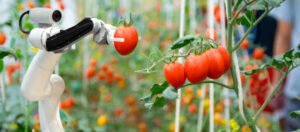

As we embark on this journey through the fertile landscape of vegetable science in startups, envision a world where the humble vegetable becomes a catalyst for transformative change, not only in our diets but in the very fabric of how we approach agriculture, technology, and the well-being of our planet.
STARTUP AREAS
Vegetable science can play a significant role in startups across various sectors, ranging from agriculture and food technology to health and sustainability. Here are some potential areas where vegetable science can contribute to startup innovations:
-
Ag-Tech Startups:
- Precision Farming: Utilize technology, sensors and data analytics to optimize vegetable cultivation, ensuring efficient resource use and higher yields.
- Vertical Farming: Develop indoor farming solutions using controlled environments, allowing year-round vegetable production in urban areas.
- Biotechnology: Explore genetic modification and breeding techniques to enhance the nutritional content, disease resistance,and overall quality of vegetables.
-
Food Technology:
- Plant-Based Alternatives: Create innovative plant-based products using vegetables to meet the growing demand for vegetarian and vegan options.
- Food Preservation: Develop technologies for extending the shelf life of vegetables, reducing food waste, and ensuring freshness during transportation.
- Nutritional Enhancement: Explore methods to fortify vegetables with additional nutrients to address specific health concerns.
-
Health and Wellness:
- Functional Foods: Develop vegetable-based products with specific health benefits, such as anti-inflammatory, antioxidant or immune-boosting properties.
- Nutraceuticals: Investigate the medicinal properties of vegetables and create supplements or health products based on their natural compounds.
-
Sustainability:
- Circular Economy: Implement sustainable practices in vegetable production, such as recycling agricultural waste, utilizing organic fertilizers, and adopting eco-friendly packaging.
- Zero-Waste Solutions: Develop technologies to utilize every part of vegetables, minimizing waste and creating by-products for various applications.
-
Smart Farming and IoT:
- Smart Sensors: Integrate sensors to monitor soil conditions, water levels, and plant health, allowing farmers to make data-driven decisions for optimized crop management.
- IoT in Supply Chain: Implement IoT technologies to track and monitor vegetables throughout the supply chain, ensuring quality, reducing losses, and enhancing traceability.
-
Education and Consulting:
- Agribusiness Consulting: Startups can provide consultancy services to farmers on adopting modern vegetable cultivation techniques, sustainable practices, and technology integration.
- Educational Platforms: Develop online platforms to educate farmers, entrepreneurs, and consumers about the latest advancements in vegetable science, sustainable agriculture, and healthy eating.
-
Community and Social Impact:
- Community Gardens: Startups can facilitate community-based vegetable gardens, promoting local produce, community engagement, and sustainable agriculture practices.
- Social Enterprises: Combine vegetable science with social impact by addressing issues like food insecurity, promoting fair trade, and supporting local farmers.
IMPACT OF STARTUPS IN VEGETABLE SCIENCE
The potential of vegetable science in startups offers a range of benefits that extend beyond economic success. These ventures can positively impact various sectors and address pressing global challenges. Here are some key benefits:
-
Sustainable Agriculture:
- Resource Efficiency: Startups can develop technologies and practices that optimize resource use, such as water, fertilizers, and land, contributing to sustainable and environmentally friendly agriculture.
- Reduced Environmental Impact: By promoting organic farming, minimizing chemical pesticide use, and adopting eco-friendly practices, vegetable science startups can contribute to reducing the environmental footprint of agriculture.
-
Innovation in Crop Management:
- Increased Yields: Precision farming technologies and genetic modifications can lead to higher crop yields, addressing the growing demand for food in a world with an expanding population.
- Disease Resistance: Genetic modifications can enhance the resistance of vegetables to pests and diseases, reducing the reliance on chemical pesticides and promoting healthier crops.
-
Health and Nutrition:
- Improved Nutritional Content: Biotechnological advancements can be harnessed to enhance the nutritional content of vegetables, providing consumers with healthier and more nutrient-rich food options.
- Functional Foods: Startups focusing on functional foods can contribute to improved public health by developing vegetable-based products with specific health benefits.
-
Economic Opportunities:
- Job Creation: The growth of vegetable science startups can lead to job creation across various sectors, including agriculture, technology, research, and product development.
- Market Expansion: Innovations in vegetable-based products can open up new markets and cater to the increasing demand for sustainable and plant-based alternatives.
-
Food Security and Accessibility:
- Year-Round Production: Vertical farming and controlled environment agriculture enable year-round vegetable production, reducing dependence on seasonal harvests and improving food security.
- Localized Farming: Community-based initiatives and startups focused on local farming contribute to localized food production, reducing the need for extensive transportation and storage.
-
Technological Advancements:
- Smart Farming: Integration of technology in agriculture, such as smart sensors and IoT devices, leads to more efficient and data-driven farming practices, improving overall productivity.
- Traceability and Transparency: Technologies for supply chain traceability enhance transparency in the food production process, building consumer trust and meeting the demand for ethically sourced products.
-
Community Engagement and Social Impact:
- Community Empowerment: Initiatives like community gardens and social enterprises create opportunities for community engagement, fostering a sense of empowerment and ownership among local populations.
- Addressing Food Insecurity: Socially focused startups can play a role in addressing food insecurity by promoting sustainable and affordable vegetable production methods.
-
Education and Awareness:
- Knowledge Dissemination: Educational platforms and consulting services contribute to disseminating knowledge about sustainable agriculture practices, technology adoption, and healthy eating habits.
- Empowering Farmers: Agribusiness consulting services empower farmers with the knowledge and tools to adopt modern practices, improving their livelihoods and the sustainability of their operations.
Conclusion
The potential of vegetable science in startups holds tremendous promise and presents exciting opportunities for innovation, sustainability, and societal impact. As the world grapples with challenges such as food security, environmental sustainability, and public health, leveraging the power of vegetable science can pave the way for transformative solutions.
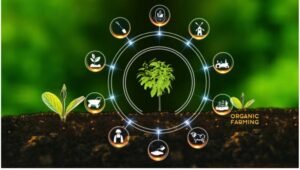

Startups focusing on vegetable science can contribute significantly to agricultural advancements by developing resilient and high-yielding vegetable varieties through breeding techniques, genetic engineering and precision agriculture. This not only addresses global food demand but also aids in the conservation of resources, reduction of environmental impact, and mitigation of climate change.
Furthermore, the integration of cutting-edge technologies, such as artificial intelligence, robotics, and data analytics, into vegetable science can enhance crop monitoring, optimize resource utilization, and streamline supply chain processes. This not only increases efficiency but also opens new avenues for automation and smart farming practices.
The nutritional value of vegetables also plays a crucial role in promoting public health and wellness. Startups can explore innovative approaches to enhance the nutritional content of vegetables, develop functional foods, or create new plant-based products to meet the growing demand for healthy and sustainable diets.
Moreover, the rise of alternative protein sources, including plant-based proteins derived from vegetables, presents a unique opportunity for startups to contribute to the burgeoning market of sustainable protein options. By developing novel processing techniques and improving the taste and texture of plant-based products, these startups can cater to the increasing consumer preference for environmentally friendly and ethical food choices.
In Nutshell, the convergence of vegetable science, technology, and entrepreneurship holds the potential to revolutionize the agriculture and food industry. Startups that embrace this intersection can not only drive economic growth but also make significant contributions to addressing some of the most pressing challenges facing our planet. As the world continues to recognize the importance of sustainable and nutritious food systems, vegetable science startups stand at the forefront of creating a more resilient, efficient, and healthier future for all.
SKUAST K under the ambit of SKUAST K Innovation, Incubation & Entrepreneurship Centre is always ready to support new young minds or budding entrepreneurs who wish to start their enterprises or have some novel or great ideas to take it forward to convert them into minimum viable products or technologies in vegetable science field can come and take advantage of this Centre situated in SKUAST K main campus Shalimar.
The authors are faculty at SKUAST-K
AgriBiz
Grassroots innovations for better sericulture
Published
8 months agoon
December 2, 2023By
BK Editor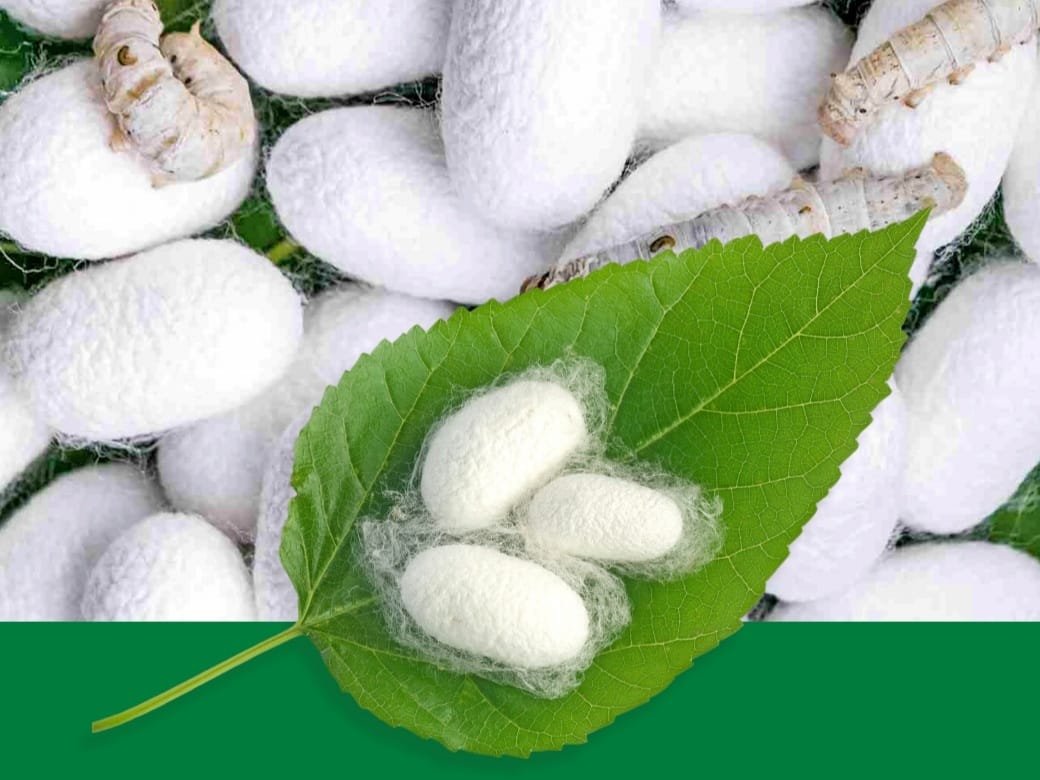

Jasmeena Qadir
Naveed Hamid
Grassroots innovations for better sericulture. Innovation means addressing a new idea, technique or solution to a problem to enhance the efficacy and durability of a system. In agriculture, innovations are the new products, techniques, or strategies developed by research scholars, farmers or organizations to maintain the sustainability of agriculture for its contribution to food security, economic development and natural resource management (FAO, 2019). Sericulture is an agro-based industry that deals with the rearing of silkworms for the production of silk. Sericulture is the greatest labour-intensive sector of the Indian economy and offers a source of livelihood to a major part of the population by providing profitable self-employment to farmers and their families. It requires low investment, a short gestation period with greater income returns and self-employment for small and marginal farmers.
It is regarded as both, an art and science which involves three major components viz., mulberry cultivation, silkworm rearing and post-cocoon processing. It comprises of a series of on-farm and off-farm activities and generates a lot of by-products from each activity directly or indirectly. Sericulture byproducts are developed as alternative options to the food industry, drug system biomedical engineering and textiles. Silkworm pupa being proteinaceous has a wide range of applications in dietetics, animal food, cosmetics and fertilizers (Jaiswal et al., 2020). Sericulture is inter-connected and inter-related with agricultural crops viz., biogas production, livestock production, aquaculture, horticulture etc. Wastes in sericulture are generated in bulk in each activity and can be exploited for biofuel, biogas, livestock production and mushroom cultivation. Seri- bio waste viz., surplus leaf, bed-refuse from silkworm rearing activity can be used for cattle and sheep fodder. The integrated system of sericulture farming with agriculture and other allied fields stimulates maximum exploitation of bio-resources of each system with the reduction in its adverse effects on the environment. Nothing is a waste in sericulture and can be potentially exploited in other sectors which promotes sustainable development and prosperity of small enterprises of other sectors. Sericulture fulfills the employment to 8.8 million people in India (CSB report, 2023) and identified by researchers and policymakers as a potential hub for socio-economic development.
INNOVATIONAL INTERVENTION IN DIFFERENT SECTORS OF SERICULTURE
-
Mulberry cultivation:
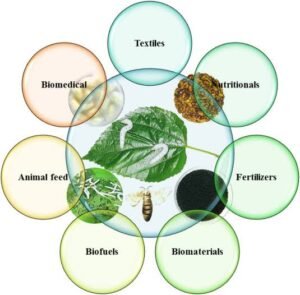

Grassroots innovations for better sericulture.
-
Innovations in silkworm rearing
Silkworm rearing is the mass scale rearing of silkworms for production of silk (Vijayakumar et al., 2007). Both on-farm and off-farm activities imparts greater employment potential feasible for women fork of the rural society as well. However, need of technological developments asserts higher silk production with better income to farming people. Contemporary sericulture has been advanced by the implementation of novel technological innovations at farm and industry level to enhance the silk productivity (Singh et al., 2021). The growth and development of silkworm is influenced by environmental factors. Therefore, the maintenance of environmental parameters as per requisites of silkworm health is a bit challenging process. However, the potential performance of novel innovations viz., Arduino aided Internet of Things (IoT), image processing technique and smart sensors of technological innovation is appraised as a master stroke key to the problem. It is simple, convenient and cost-effective solution to achieve successful cocoon crop production (Rokhade et al., 2021). One more innovation, is the development of Internet of Things (IoT) empowered Wireless Personal Area Network (WPAN) system using sensors for monitoring of environmental factors according to recognized different life cycle stages and capturing photos simultaneously to achieve the improvement in series of life cycle stages in silkworm (Nivaashini et al., 2018). Many models have been proposed time to time based on Internet of things (IoT) for the development of smart sericulture technology to promote sericulture (Srinivas et al., 2019; Sreedhar et al., 2020; Eethamakula et al., 2020; Jeegadeesan et al., 2021). In the UT of Jammu and Kashmir, there are three different agro-climatic zones viz., temperate, intermediate (lies between temperate and sub-tropical) and sub-tropical zone. Therefore, there is need of different mulberry cultivars, cultivation practices and silkworm breeds which are specific to different agro-climatic regions. The development of region specific silkworm is of prior importance to revive sericulture industry in Jammu and Kashmir. Fortification of mulberry leaves with proteins and other supplements is a latest technique to enhance the cocoon production. It employs use of different plant or animal based products rich in proteins more particularly to feed the silkworm larvae (Qadir et al., 2022 a). A chawki leaf chopper for chopping the mulberry leaf in thin slices for consumption of young age larvae have been developed. An artificial silkworm diet known as “Nutrid” have been developed for healthy and vigorous growth of silkworms. CSRTI Mysore, have developed a device which acts as both heater and humidifier as per requirement of rearing room. Collection of matured larvae and their mounting on mountage is a laborious process. A plant based hormone which comprises of photoecdysone known as “Sampoorna” have been developed for early and uniform maturation of silkworms. A device which picks and separates matured silkworms from mulberry twigs in shoot system of rearing and from trays in tray system of rearing have been developed with almost negligible injury risk to silkworms. Disinfection is the foremost operation to be carried before commencement of silkworm rearing to maintain the pathogen-free environment for silkworm. An ecofriendly and cost-effective tool which employs the use of fire-flames and LPG as fuel known as flame-gun, have been developed to disinfect the incubation, rearing, leaf, cocoon storage room and rearing equipments. Many bed-disinfectants have been developed such as., labex, Ladhoi, Jeevan- Sudha, Resham Jyoti, RKO, Sericillin, Ankush, Vijetha, Amruth to defend the disease causing pathogens in silkworm rearing. Manual dusting of bed-disinfectants is unsafe for applier. CSRTI Mysore have developed power/battery operated duster which evenly speads the disinfectants over the silkworm body on trays in less time.Pest control can be achieved by application of uzitrap, uzicide etc to control the major pest, Exorista bombycis in silkworm rearing. Plastic tray washing machine possesses efficiency of washing 120 trays/hr with complete disinfection are developed to save the labour charges and time in silkworm rearing.
-
Innovations in post-cocoon sector
The collection and separation of cocoons from cocoon frames is laborious and time consuming process. The development of handle/ pedal operated cocoon harvesting machine used for harvesting from 25-50 frames/hr and 50-60 frames/hr from hand operated and pedal operated harvester respectively. Deflossing is the process of removing floss layer of the cocoon. Manual deflossing is time consuming process and requires labour. Cocoon deflossing machines viz., hand operated, hand operated cum motorized and fully motorized which can defloss 25-30 kg/hr, 50-60 kg/hr and 75-80 kg/hr respectively have been developed. In grainages, an ample quantity of cocoon needs to be cut for sex determination of pupae and estimation of quantity parameters such cocoon weight, shell weight and shell ratio. Cocoon cutting machine have been developed with efficiency of cutting 5000 cocoons/hr have been developed. Cocoon boiling or cooking is the process of boiling the cocoons to soften the sericin layer for smooth unwinding of silk fibre from the cocoon. It is mostly carried by simple cooking either in a single-pan system or in a three-pan system at different temperatures. These methods render the cocoons either over-boiled or under-boiled which are unsuitable for the reeling process. A new technique “Vacuum boiling machine” has been developed in which the uniform softening of all the layers is attained with better reelability. Metallic buttons are non-circular stainless steel devices used as thread guides with required specifications as that of yarn size, have been developed to avoid slubs in yarn and can be used for a comparatively longer time.
Conclusion
Sericulture being the labour-intensive sector provides a source of profitable self-employment to a large number of the Indian population. Labour wages cost about 65-70% of the total cocoon produced from different sectors of sericulture in India. Hence reduction in labour dependency will ultimately reduce the production costs. The farming technicality in each sector of sericulture is the need of the hour. Innovations play a prominent role in accomplishing the goal. The novel ideas related to different approaches, appliances, and techniques connected with farming people can be explored in developing sericulture. Investment in technology, promotion of technologies and conduction of training programs can contribute to improving the competence in sericulture. The acceptance of challenges and adoption of innovations can lead to developments in sericulture.
Naveed Hameed is CEO, SKIIE Centre, SKUAST-K
Jasmeena Qadir has PhD in Sericulture


Haryana Biodiversity Board commemorates International Biodiversity Day at GNK Group Of Institutions


Kya kuchh tha jiske kehne ko: A tribute to father


GNK hosts JAI scholarship distribution function


Administrative Council approves J&K Startup Policy 2024-27


How to begin investing


The rising modest fashion sector of Kashmir


J&K Oil Tankers Union demands package, seeks tax rebate for transport sector in Budget 2024


Lenskart enters Kashmir market, opens shop at Regal Chowk


Economic and Environmental Implications of Sand Mining in Kashmir Division


SKUAST-K innovator clinches Rs5lakh RKVY Raftaar grant
Trending
-

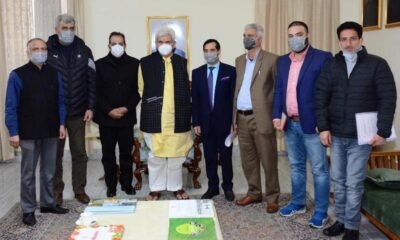

 Industry3 years ago
Industry3 years agoFCIK hails LG Sinha for creating entrepreneur-friendly industrial ecosystem
-

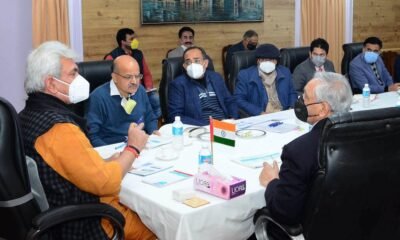

 Energy4 years ago
Energy4 years agoLt Governor discusses J&K power scenario with experts
-



 Economy1 year ago
Economy1 year agoGlobal eCommerce boom and local traders of Kashmir
-

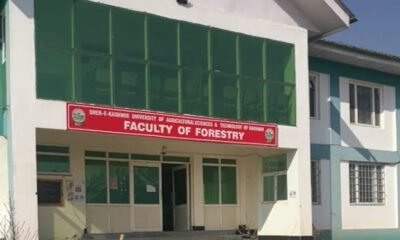

 Infra3 years ago
Infra3 years agoSKUAST-K bags EU project for urban green infrastructure
-

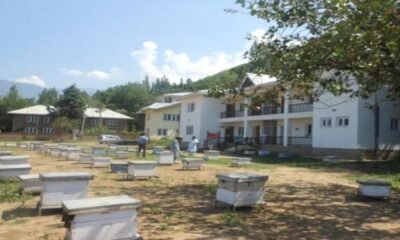

 AgriBiz3 years ago
AgriBiz3 years agoSKUAST-K to set up 3 honey testing labs in Kashmir
-

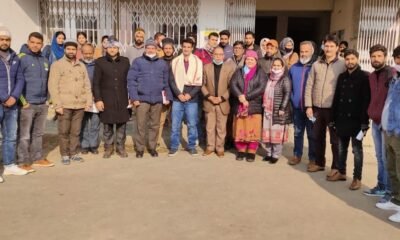

 Careers4 years ago
Careers4 years agoSKUAST-K holds career counselling at Wadura campus
-



 Economy4 years ago
Economy4 years agoLt Governor announces new industrial policy for J&K
-



 Industry4 years ago
Industry4 years agoImran Murtaza takes oath as president Industrial Association Khunmoh

